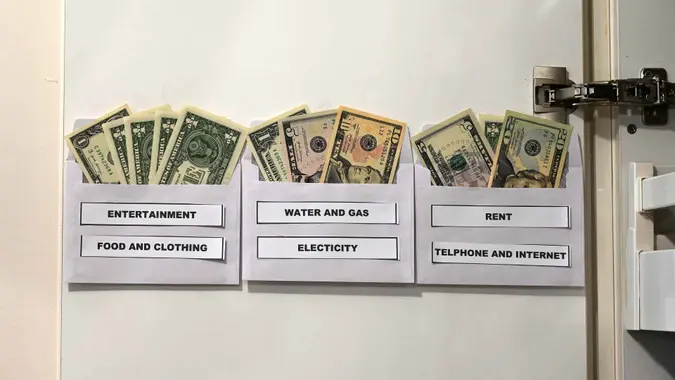4 HSA Tax and Retirement Secrets You Need To Know

Commitment to Our Readers
GOBankingRates' editorial team is committed to bringing you unbiased reviews and information. We use data-driven methodologies to evaluate financial products and services - our reviews and ratings are not influenced by advertisers. You can read more about our editorial guidelines and our products and services review methodology.

20 Years
Helping You Live Richer

Reviewed
by Experts

Trusted by
Millions of Readers
Are you using your health savings account to its maximum benefit? If you are like many Americans, you probably aren’t.
A new research report from the Employee Benefit Research Institute found that most Americans:
- Contribute less than the maximum allowable amount to their HSA
- Maintain a modest balance
- Do not invest the money
- Do not take advantage of inherent tax benefits of their HSA
The report found that employer and employee contributions dropped in 2021, the most recent year studied, compared to 2020. The average combined HSA contribution was $927 less than the statutory maximum for individual coverage and $4,527 less than the maximum for family coverage, according to the report.
Additionally, only 12% of accountholders invested in HSA funds rather than save the money as cash. With Medicare costs rising, many Americans could find their retirement savings running short as they pay for health expenses. Maximizing HSA contributions now could offer some relief in later years when you’re on a fixed income.
GOBankingRates spoke to tax and financial experts on the best ways to maximize your HSA now and in the future.
Take Advantage of the Triple Benefits of an HSA by Maxing Out Your Contributions
One mistake Americans make is not maxing out their contributions to take advantage of all the tax benefits.
“An HSA is triple tax-free,” explained Charles H. Thomas III, Certified Financial Planner, Intrepid Eagle Finance. “This means you get a tax deduction when you put money in, tax free growth while in the account, and then tax-free withdrawals for qualified medical expenses later on,”
You cannot make contributions past age 65, so you’ll want to sock as much savings as you can into your HSA before you reach retirement. And, if you’re already in your 40s or 50s, it’s still not too late to start. As with a 401(k), you’ll have a catch-up period as you near retirement age.
“When individuals reach age 55 by the end of the taxable year, the annual contribution limit is increased by $1,000,” said Matthew Kardish, CPA, manager at Stephano Slack.
Be Cautious in How You Spend HSA Funds
There are virtually no drawbacks to maxing out your HSA contributions, especially if your employer matches funds.
“Tax ramifications are limited if you do not pull money from the HSA,” said Jim Eutsler, Certified Financial Planner and partner at HCM Wealth Advisors, a member of The Hengehold Financial Group.
However, you’ll need to be enrolled in an eligible high-deductible health plan before you can open an HSA. And be certain that the medical expenses you pay for with your HSA qualify for tax-free withdrawals, the experts said.
“The IRS list of expenses is extensive, but don’t assume a procedure or medication is on the list. Check to make sure or consult with a professional,” Thomas advised.
“When distributions are not used to pay medical expenses, they are subject to income tax,” Kardish warned. “It is important to maintain records and keep receipts for tracking purposes. Unallowable distributions are also subject to an additional 20% penalty tax,” except in certain cases.
After the age of 65, you can take penalty-free withdrawals for any purpose, although you won’t enjoy the tax benefits if you use the money for living expenses or other purposes. “For it also to be tax free,” Kardish said, “it must still be for a qualified medical expense.”
Invest Your HSA Funds
Since most individuals and families are unlikely to use all their HSA money on medical costs in their early years, it makes sense to invest the cash so it can grow, tax-free.
“If you build up a large balance in your HSA, don’t just let it all sit in cash. Consider investing at least a portion of your HSA to keep pace or beat inflation,” Thomas said. “HSAs can invest in many options such as mutual funds or exchange traded funds (ETFs). Check with your provider to see what options you have access to.”
Let the Money Grow for Retirement
For some families fortunate enough to have low healthcare costs in their working years, it might make sense to pay medical expenses out-of-pocket and let your HSA account grow for retirement.
“Some households choose to pay medical expenses out of pocket with cash rather than always make withdrawals from their HSA,” Thomas said. “This allows the HSA to grow and compound over time. After many years of this practice, an HSA can become a powerful way to supplement retirement savings.”
“HSAs can be a great help to retirement savings because they give you a tax-free income source to pull from for paying down a yearly expense, healthcare, which is only likely to increase with time,” Eutsler concluded.
More From GOBankingRates
 Written by
Written by  Edited by
Edited by 

























